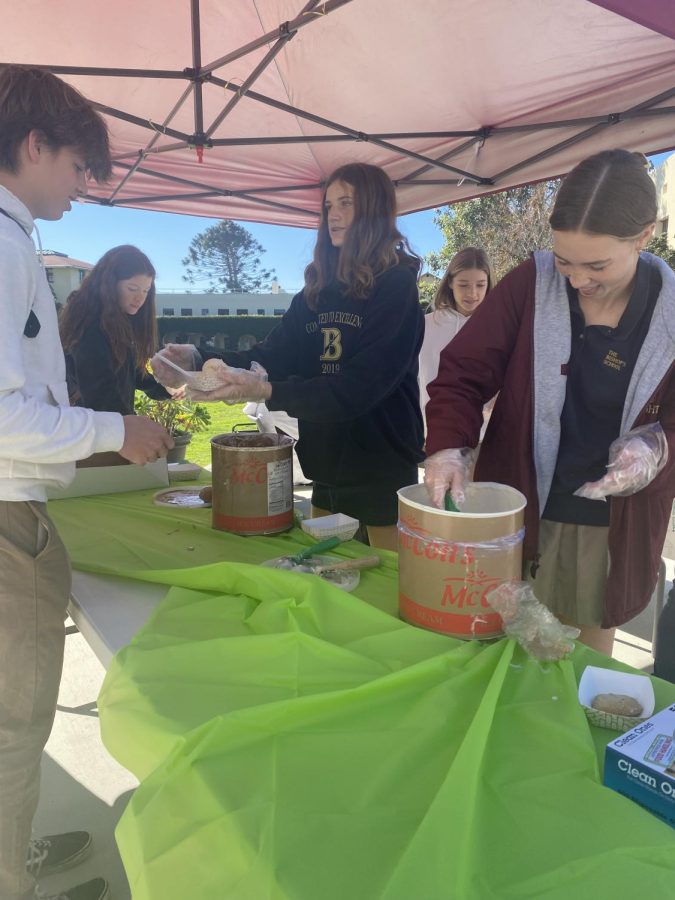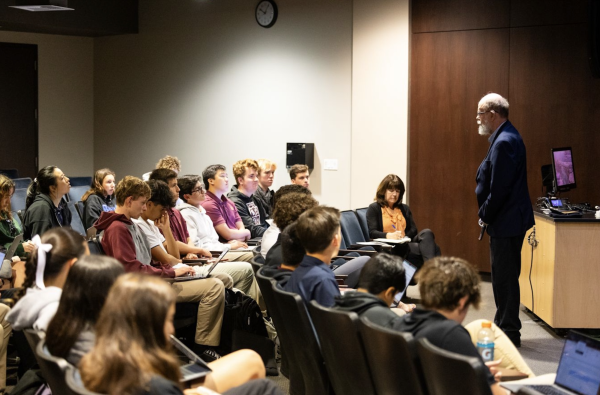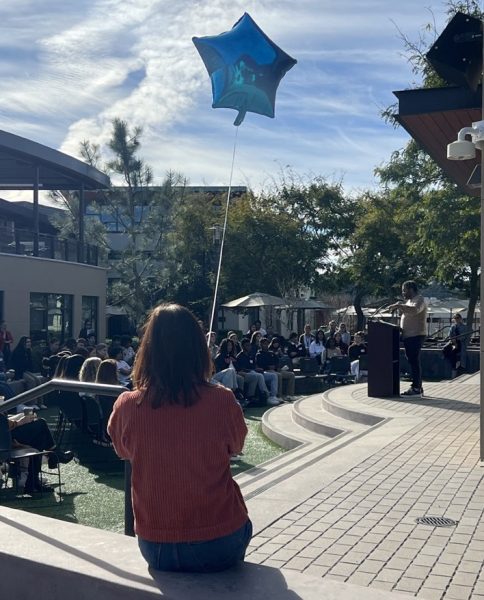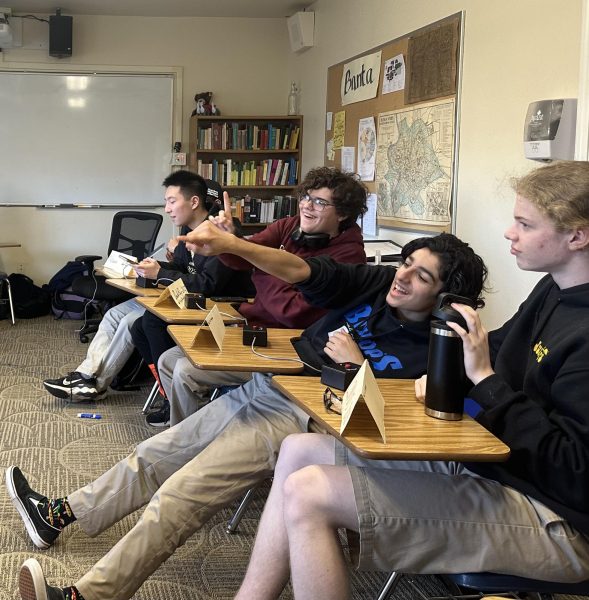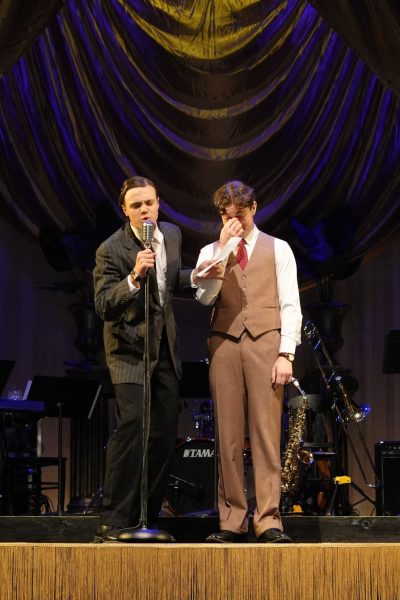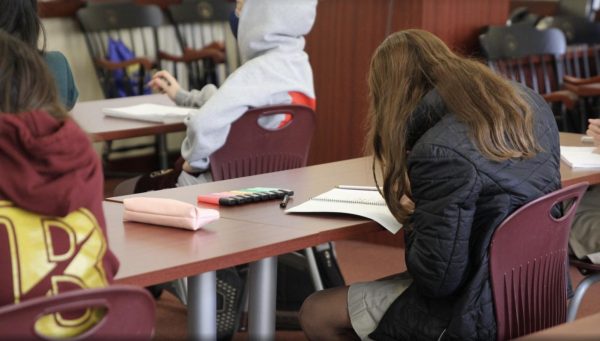A Spoonful of Sugar to Help the Message Go Down
At Bishop’s bake sales, desserts incentivize students more than the cause itself.
Lucky Ducklings members sophomores Gabby Anderson and Adelaide Kessler sell cookies and ice cream scoops to students at the club’s bake sale on January 31 during Lucky Duckling’s week.
With lines piling up quickly during lunches, service club bake sales have always been popular among Bishop’s students. Leader of Lucky Ducklings Simmons Arnold (‘23) said, “The middle schoolers get really excited about anything sweet.” Based on the low turnout of a recent fundraiser — the Penny Wars held by Step Up Club that did not involve a bake sale — Bishop’s students seem to be incentivized by the purchase of desserts from service club bake sales rather than the donation to the cause.
Delicious desserts lead to high-profit margins at Bishop’s service club bake sales. “Krispy Kreme donuts go crazy,” said President of Key Club, Lilian Franqui (‘25), “We went through something like three or four boxes in an hour.” The focus of bake sales is often on the product — home-baked or store-bought goods — rather than on the cause the collected funds will be supporting.
The School has over 40 student-led service clubs that each work to solve world or community issues through service projects and hand out service hours to students so they can meet the yearly 20-hour requirement. Service clubs are popular amongst the student body because they allow students to meet this requirement and help the community. The thing that makes them even more popular, though, is the bake sales set up every few weeks during middle and upper school lunches.
Step Up Club, a service club led by Brooke Fitzcluster (‘23) and Emi Ayala Sekiguchi (‘24), focuses on supporting and increasing awareness of cancer and its effects on patients who suffer from it. The club recently organized a school-wide Penny Wars fundraiser in conjunction with Key Club led by Lilian.
Penny Wars is a popular fundraising event in the community service industry, with many service clubs across the nation holding these same events, but it has not been particularly common at Bishop’s. For Cure Cancer Week from October 31 to November 4, 2022, the club organized the competition to raise money for the organization in their fight to cure cancer and bring awareness to it. Brooke announced that the grade that donated the most pennies, (one penny is equivalent to one point), would win a prize. It is also possible to donate larger bills in the Penny War jars of other grades to deduct points from their score.
Although it seems that this engaging fundraising competition would attract a lot of profit in support of Step Up Club’s cause, it only raised $213 last year, a sum lower than the average bake sale hosted during one school lunch. According to Director of Community Service Mrs. Jacqueline Gomez, “The Lucky Ducklings have done around $800 on the root beer float sale. And then I’ve seen downwards of between $200 and $300” for bake sales. This was the case despite the Penny Wars lasting two school weeks whereas all other campus bake sales last one day.
What’s more, Step Up Club also organized two bake sales during school lunches during Cure Cancer Week this year, raising $501. Additionally, last spring, Step Up Club raised $962 from one bake sale. These bake sales lasted about two hours each, for the duration of Middle School and Upper School lunches. The profit margin of bake sales compared to those of penny wars—an average of $487 per day compared to the $213 raised over two weeks— proves that desserts have a direct correlation with the profit margin of fundraisers.
In addition, students treat bake sales like dessert stands where they can buy the sweet treats they wouldn’t otherwise have access to at school. Emi said, “Everyone rushes when they see the food like they don’t really see the cure cancer posters. Many of them come for the food, but then, we immediately try to explain what it’s for.”
The Lucky Ducklings Club experienced a similar problem. Leader of Lucky Ducklings Simmons Arnold (‘23) said, “We try and write facts down on posters or card stock, but again, the food is a big distraction. I can’t blame them! A snow cone probably is more interesting to the everyday student than reading some facts written on a sheet of paper.”
Mrs. Gomez has noticed this and shared some solutions. She said, “We usually have a QR code or an activity that students can do before they buy a baked good so they can realize what it’s for and who it is benefitting.”
Although it seems as though Bishop’s students are willing to pay the marked-up prices at bake sales to support a good cause, prices are similar to the ones of snacks like brownies sold at Milk Break. Students still line up and pay for the coveted cookies and banana bread every day, even though the profit goes only to the School and not to support a service club’s projects.
“On the other hand,” Emi said, “Last week there were a bunch of people that just donated without anything and they even brought their friends to donate. So we saw a lot of both ends.” Brooke continued by explaining that it’s important to tailor to both types of Bishop’s students: those who donate to support the cause and those who just want a treat.
Lilian said, “Teachers were really willing to donate. Like, sometimes they wouldn’t even take a good when they were just donating money.”
In the daily bulletin and flyers posted around the School, the emphasis is placed on the special dessert being sold — milkshakes, root beer floats, Dip-and-Dots, donuts, and an assortment of baked goods — to attract a crowd. Mrs. Gomez reflected, “I would love it if our school would be a little bit more mindful when we have a bake sale and ask what they are supporting. It is always for a good cause.”

Emeraude is a senior and this is her second year on The Tower. This year, she is a Content Editor and she loves covering campus events and trends. Along...


